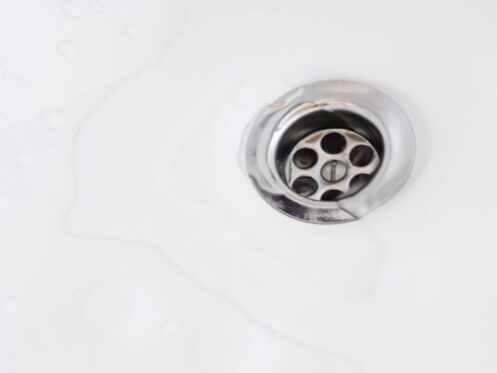When your drains start moving slowly, your first instinct might be to pour some Drano down the plumbing. While Drano and other chemical drain cleaners are a convenient and popular choice, they are not ideal. Compared to other drain cleaning solutions, like using an auger, chemical drain cleaners have several downsides. Here is why you should avoid using Drano in your plumbing.
Chemical Drain Cleaners Are Dangerous to Use
Chemical drain cleaners like Drano work by using corrosive substances to dissolve the waste, grease, or paper that makes up a clog. They can also damage organic matter, like your skin. If Drano splashes back and gets on you, you can develop rashes or even chemical burns. These chemicals are especially dangerous if they get in your mouth or eyes. One small accident with chemical drain cleaners can lead to permanent and severe damage.
As it takes effect, Drano releases toxic byproducts. Depending on the cleaner you use and where you use it, it could even react with naturally occurring ammonia to create a very dangerous and caustic substance. If you are in a small, enclosed space, these fumes can be very dangerous to breathe. Inhaling drain cleaner fumes can irritate the sensitive linings of the nose and throat, resulting in a cough and difficulty breathing. If your household includes any children, pets, or people with respiratory issues, you should avoid Drano.
Drano can linger in your pipes for a surprisingly long amount of time. This can make it unsafe to work with the pipes if there is a need for a repair. If you still have problems after you add the Drano, you need to inform a potential plumber of the situation. Otherwise, when they go to work on your plumbing, the residual Drano can still harm them.
Drano Can Damage Your Plumbing
Many people assume it is fine to use Drano because it’s marketed as being safe for your pipes. While it is true that Drano will not directly dissolve your pipes, it can still cause some problems. Keep in mind that certain plumbing fixtures are not impervious to Drano. It can cause corrosion that discolors the fixture or even weakens its protective finish.
Chemical drain cleaners can also cause problems when used multiple times in a short period of time. If you have a recurring clog, you might find yourself pouring Drano down the drain several times each year. Chemical drain cleaners generate a lot of heat as a byproduct of their chemical reaction. This repeated application of high heat can harm your pipes. If Drano keeps sitting in the same spot for a long period of time, your pipes can warp, crack, or break. In some cases, chemical drain cleaners end up causing disastrous leaks in a plumbing system.
Chemical Cleaners May Lead to Environmental Issues
Long after they leave your plumbing, chemical drain cleaners can lead to issues. Drano and other similar chemicals can remain active for weeks. During this time, they exit your home’s plumbing system and flow into your waste removal system. Depending on how wastewater is handled in your area, this can lead to Drano being released into your septic drain field or the city’s wastewater treatment ponds.
When highly diluted, Drano can lead to chemical imbalances in your local water supply. Any fish, birds, or other creatures that come in contact with the contaminated water might also be in danger.
The Risk of Overlooking Other Issues Related to the Clog
One big danger of chemical drain cleaners is that they’re often used at the wrong time. Plumbing issues are often complex. A drain that appears to be clogged might actually be a leaky drain pipe. Some types of clogs, such as those from tree roots, also indicate that your drain line has cracks in it.
If you just dump chemical cleaner down your drain every time you notice it is moving slowly, these bigger problems might not get diagnosed and resolved. Because the drain cleaner temporarily speeds up your drains, you can end up assuming it is fixed your plumbing. However, you are then left with other issues that can cause further damage to your house.
The only way to ensure you do not have leaks, cracks, breaks, or loose fittings is to work with a professional plumber. Since they will inspect your plumbing system more thoroughly, they will ensure that all potential damage is identified. Otherwise, you might end up repeatedly pouring drain cleaner down your drains without realizing your home is also dealing with water damage or mold growth in areas you cannot immediately see.
Chemical Drain Cleaners Can Harm Septic Systems
If you use a septic system for your home, it is especially important to avoid Drano. As we previously mentioned, Drano can cause harm to aquatic life, and this has some similar implications for septic systems. Septic systems use beneficial bacteria to break down waste material. Unfortunately, these bacterial organisms tend to die off after they come into contact with Drano.
Even amounts as small as half an ounce of Drano can be enough to kill most of the bacteria in your septic system. When this happens, your septic system processes wastewater more slowly. Solid material does not get broken down anymore, so it backs up. This can cause further clogs unless you take the time to add a beneficial septic bacterial additive to your tank.
Drano Might Not Solve the Bigger Problem
The final thing you need to know is that Drano is only a temporary solution. It may solve your current clog, but unfortunately, most plumbing clogs are recurring. Some homeowners get a single, random clog from a mistake like pouring grease down a drain. However, the majority of clogs are actually caused by plumbing problems, like an improperly sloped drain line. Anything that causes your wastewater to move slowly or pool in random corners encourages clogs to form.
If you are trying to treat the clog with Drano, you aren’t addressing the underlying problem. This leads to frustrating situations where you just get the same clog over and over again. If you want to truly solve the problem instead of just treating the symptom, you will need to adjust your plumbing system setup.
Instead of using a chemical drain cleaner, you’re better off hiring professionals to manually clear your drains. Manual methods like drain snakes help remove the clog without the unpleasant side effects of Drano. Professional drain cleaning also helps to catch any potential plumbing problems that might be contributing to your clog. If your drains are slow, blocked, smelly, or gurgling, Laury Heating Cooling & Plumbing can help. Our team can identify potential drain clogs and remove them as safely and effectively as possible. We serve Pennsville and the entire South Jersey region, offering a wide range of other HVAC, and plumbing services as well. Call Laury Heating Cooling & Plumbing today to schedule your next repair, installation, or maintenance visit.



